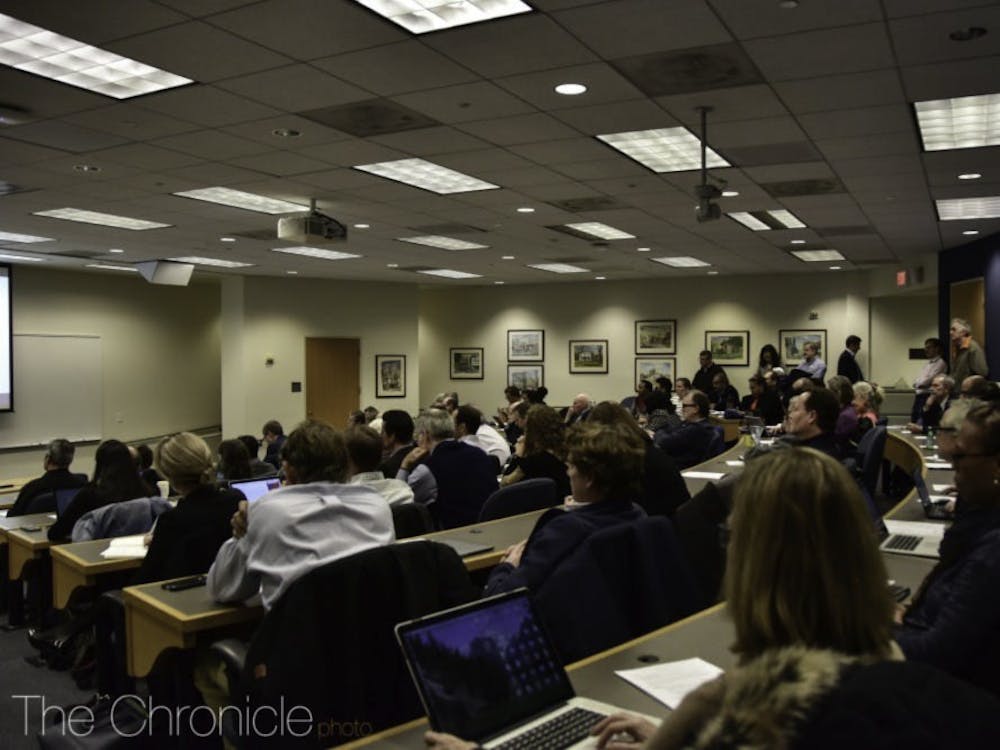Fresh off the first week of classes, faculty sat enraptured in the recesses of the Divinity School as they heard presentations about Durham, libraries and a survey.
Stelfanie Williams, vice president of Durham and community affairs, kicked off the proceedings by briefly delving into the history of her office, which Duke officially opened in 2008 as the Durham and Regional Affairs office under Phail Wynn, who retired in June 2018 and died a month later.
Williams told the faculty governance body that her focus lies at the intersection of three themes: quality of life, Duke’s roles or identities in the community and needs that Durham residents and leaders have identified. When asked by a faculty member how the DCA office handles politically charged issues, such as abortion or voting rights, Williams said that most of those issues won’t be a concern for her because they fall outside the intersection of her three themes.
“My concern is if our office is involved in too many things that really don’t center on the highest priorities of the community, where Duke’s mission is focused and quality of life, then we will be doing a lot of things and none of them well,” she said.
She spoke about engaging with Durham residents and community leaders instead of Duke trying to solve problems on its own, expressing her desire to work closely with the faculty in the room and take advantage of their expertise. Williams mentioned that there are 6,500 nonprofits in the Triangle, excluding faith- and education-based organizations, and that Duke could do a lot to support them.
“There are a host of nonprofit organizations that are doing good work that we can be a part of by lifting, supporting, collaborating, utilizing the resources—not just financial but intellectual—of the University,” she said.
Deborah Jakubs, vice provost for library affairs, equipped with a slideshow full of data to educate the faculty on the library system’s work and goals, followed Williams on the docket. She said she couldn’t think of an institution at Duke that has changed more than Duke Libraries in the past 10-15 years, given all the renovation and digital expansion the libraries have undergone.
Since Jakubs arrived in 2005, Duke has added to or renovated many of the West Campus libraries, such as the Link, the Edge and Rubenstein Library.
Lilly Library is up next for renovation, which will cost around $47 million. Jakubs admitted that “some students call it creepy,” and she hopes that the renovation sparks more changes on East Campus.
Jakubs displayed statistics on the library budget as well. Among Duke’s Ivy+ peers, the University ranks second in open hours at a library, but last in average professional salary. The library raised almost $11 million in funding in Fiscal Year 19, supported by a $5 million gift from the Lilly Endowment Inc. for Lilly Library renovations. Salaries and wages account for 43% of the library’s budget, 34% of the budget is allocated to its collections and the rest is allotted to students, travel, technology and other miscellaneous expenses.
Claudia Gunsch, associate vice provost in the office of faculty advancement, ended the meeting with an announcement about the impending faculty satisfaction survey. The last one was administered in 2015.
Get The Chronicle straight to your inbox
Sign up for our weekly newsletter. Cancel at any time.

Jake Satisky was the Editor-in-Chief for Volume 115 of The Chronicle.

